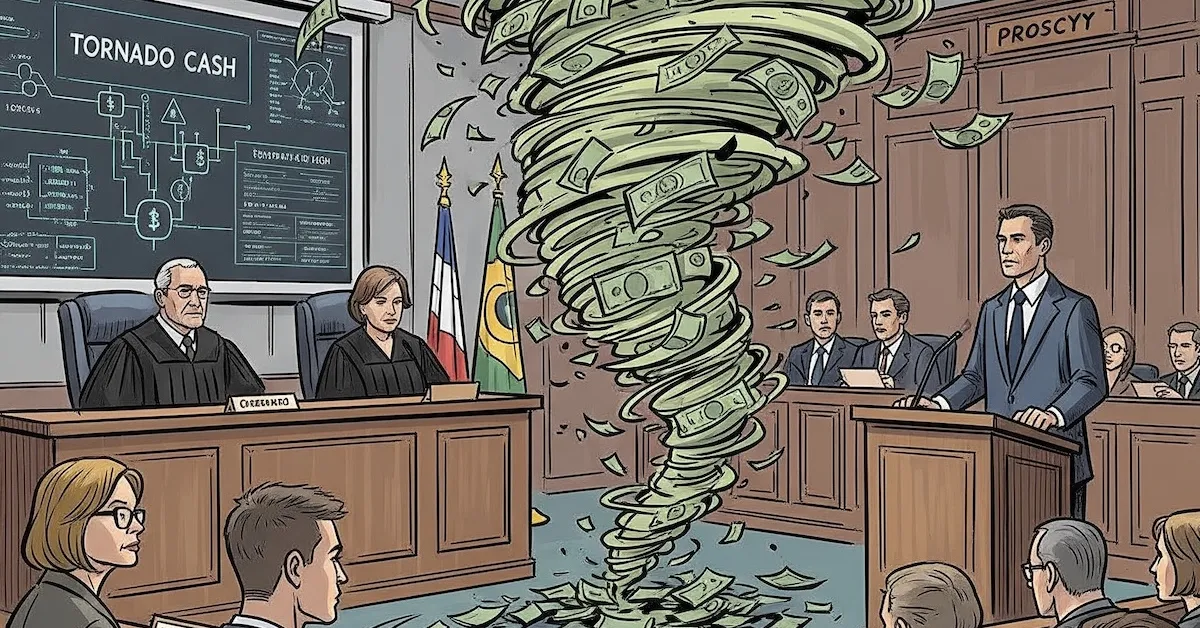Historic Tornado Cash Verdict: Roman Storm Convicted, Sparking Industry-Wide Debate

The Tornado Cash trial has presented high-stakes implications for developers of noncustodial Bitcoin and crypto technology, as well as for privacy-preserving software. Amanda Tuminelli, executive director and chief legal officer for the DeFi Education Fund, offered extensive insights into these challenges, particularly focusing on the charges against Tornado Cash co-founder Roman Storm. Her expertise centered on 18 U.S. Code § 1960, a federal law prohibiting the operation of an unlicensed money transmitting business, which was a core charge against Storm.
Tuminelli meticulously broke down 18 U.S. Code § 1960, arguing that Storm had not violated this statute in the creation and operation of Tornado Cash, an Ethereum-based crypto mixing service. She emphasized the distinction between controlling and non-controlling crypto technology, highlighting bills like the CLARITY Act and the Blockchain Regulatory Certainty Act (BRCA). These legislative efforts include language designed to protect developers of noncustodial technology, stipulating that such developers and purveyors should not require a money transmitting license nor be subject to existing money transmission laws.

Photo Credit: Cointelegraph
Furthermore, Tuminelli pointed out the Department of Justice's (DoJ)shift away from 2019 FinCEN guidance, which she believes threatens innovation in the crypto space. This shift, she argued, could lead to a scenario where the U.S. government continues to press charges against other developers, despite a memo from U.S. Deputy Attorney General Todd Blanchestating that the DoJ would cease targeting crypto entities, including mixing and tumbling services, for the acts of their end users. The DeFi Education Fund, in its commitment to these issues, submitted amicus briefs for both the Tornado Cash and Samourai Wallet cases, though the brief for the former was rejected.
The Tornado Cash trial concluded with a significant verdict: Roman Storm was found guilty on the second count of his indictment, conspiracy to operate an unlicensed money transmitting business. The jury, however, did not reach a unanimous verdict on the other two counts, which included conspiracy to commit money laundering and conspiracy to violate sanctions. This guilty verdict, reached after three and a half days of deliberation, now subjects Storm to a potential sentence of up to five years in prison.
Following the verdict, the prosecution motioned to remand Storm into custody, asserting he was a flight risk. This motion was strongly opposed by the defense, whose representative, Ms. Klein, presented compelling arguments against it. She highlighted Storm's significant ties to the United States, including his home in Washington state being secured by a $2 million bail bond, his partial custody of a daughter, his girlfriend being based in the U.S., and his parents being green card holders. Additionally, much of the crypto community supporting Storm is U.S.-based, and they are expected to continue their support through his appeal process.
Judge Failla ultimately rejected the prosecution's motion to remand. She reasoned that the “stability of the verdict is still in play,” suggesting the strong likelihood of an appeal, and acknowledged that Storm’s “incentives have shifted tremendously” post-conviction but did not warrant immediate custody. This decision underscored the ongoing legal battle and the potential for further challenges to the verdict.

Photo Credit: The Block
Shortly after the verdict, U.S. Attorney for the Southern District of New York, Jay Clayton, issued a statement. Clayton asserted that “Roman Storm and Tornado Cash provided a service for North Korean hackers and other criminals to move and hide more than $1billion of dirty money.” He emphasized that while digital assets offer promise, this cannot excuse criminality, and committed to holding accountable those who exploit emerging technologies for illicit activities.
However, Clayton's statement notably omitted any mention of Deputy Attorney General Todd Blanche’s memo concerning the DoJ’s updated approach to virtual currency mixing services. He also did not acknowledge that the vast majority of funds moved through Tornado Cash users were not proven to have been obtained illicitly, highlighting a potential disconnect in the government's narrative versus its internal guidance and factual context.
You may also like...
AMG Unleashes a Beast: The GT2 Edition W16 Breaks Records, But Without Its Namesake Engine!

Mercedes-AMG has unveiled its most extreme customer racing car, the GT2 Edition W16, a track-only limited edition inspir...
Mercedes Shocks with G-Wagen Cabriolet Tease: Iconic SUV Goes Topless!

Mercedes-Benz has officially announced the return of the G-Class Cabriolet, slated for release in 2026, bringing an open...
US Gov Makes History: GDP Data Now Immortalized on Bitcoin Blockchain

The U.S. Commerce Department has begun publishing gross domestic product (GDP) data on public blockchains like Bitcoin a...
Tornado Cash Verdict Drops: Roman Storm Convicted in Landmark Crypto Trial

Tornado Cash co-founder Roman Storm has been found guilty of conspiracy to operate an unlicensed money transmitting busi...
Luxury Giant's Legacy: Armani's Empire Passes to Heirs After His Death

The fashion world mourns the passing of Giorgio Armani, who at 91, leaves behind an independent empire entrusted to his ...
AI Data Centers Exposed: $165 Billion 'Phantom Debt' Scandal Looms Over Tax Breaks

Doña Ana County, New Mexico, is pursuing an ambitious plan to become a major AI data center hub through 'Project Jupiter...
Political Titans Mobilize: Ambode & Speaker Tajudeen Lead Charge for Tinubu's 2027 Re-election Bid

Key political figures, including House Speaker Abbas Tajudeen and former Lagos Governor Akinwunmi Ambode, have publicly ...
Tinubu's Bold Naira Claim Sparks Fact-Check Fury: Was it N1,900/$ or N1,450/$?

President Bola Ahmed Tinubu recently claimed the naira strengthened significantly under his tenure, citing an improvemen...